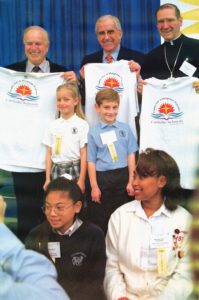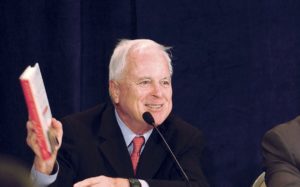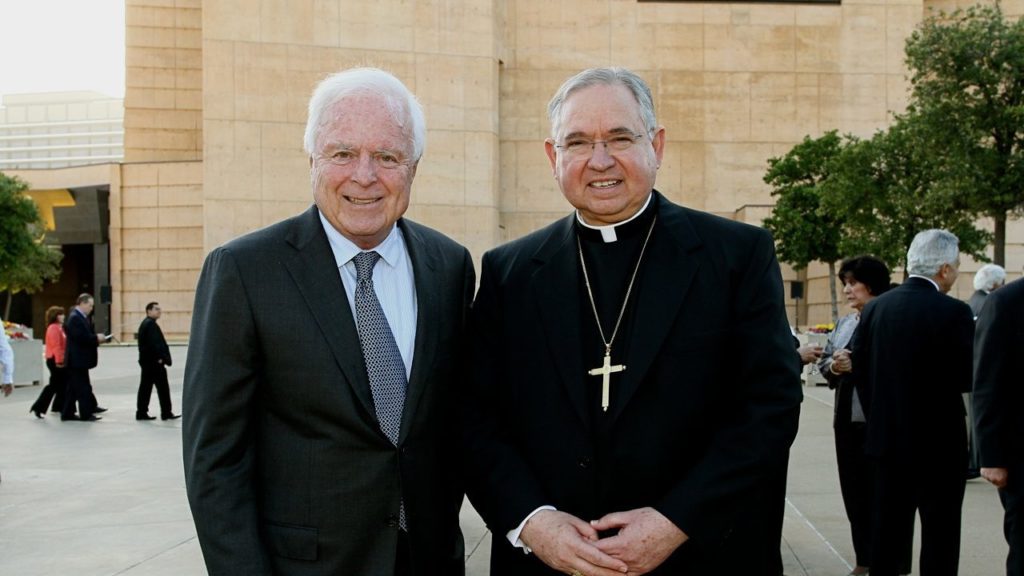Six years before Richard Riordan was elected by an overwhelming margin as mayor of Los Angeles, the first Catholic to serve as the city’s mayor in the modern era, he was a founding trustee and the first president of the Catholic Education Foundation of Los Angeles (CEF).
Riordan, known as a pragmatic philanthropist, would later describe his work in education as “the thing I am most proud of having done in my life.”
Riordan, who died at the age of 92 on April 19, was L.A.’s 39th mayor and, by his own doing, served just two terms, from 1993 to 2001. It came after two mayors — Sam Yorty and Tom Bradley — who had held the position for a combined 32 years.
He made a name for himself as a lawyer, businessman and investment banker. As mayor, he is best remembered for directing a rebuild of the city’s economic foundation after the 1992 Rodney King riots and for stabilizing its future infrastructure in response to the 1994 Northridge earthquake.
But his work in education before his surprise mayoral run — and its continuation years later — reflected a lifelong passion.
Two years after arriving in Los Angeles, then-Archbishop Roger Mahony recruited Riordan to help launch CEF in 1987. It turned out to be a natural fit for a businessman who deeply studied philosophy, law, and ethics.
When schools in the archdiocese first faced the danger of closing — due in part to the surge of better-paid lay teachers replacing the dwindling number of men and women religious instructors — Riordan got to work, recruiting business leaders such as Peter Mullin and Richard Ferry to the CEF table. Today, the non-profit reports net assets of more than $400 million. It has given away more than 215,000 tuition grants in excess of $242 million over the last 35 years.
“Dick’s response was his typical enthusiastic acceptance of the challenge,” Cardinal Mahony recalled of the episode in a reflection shared with Angelus.
“His foresight and guidance has been instrumental in making sure a Catholic education remains accessible and affordable and that will be a big part of his legacy,” said CEF Executive Director Doug Cooper. “It remains part of our messaging that, as he believed, every child had a God-given right to a quality education.”
Mayor Riordan was often quoted as saying, “Every child deserves a quality education.” His passion, dedication, and commitment to our mission is something we will never forget, and we have been blessed by his generosity and support for the students and families that we serve. pic.twitter.com/ulhI5koc8s
— CEF (@CEFDN) April 20, 2023
Riordan was the youngest of eight children to a wealthy Irish-Catholic family in New York. He attended an all-male Jesuit prep school and studied for two years at Jesuit-run Santa Clara University where he played football. He transferred to Princeton to earn a degree in philosophy.
In a 1993 interview with a Princeton alumni newsletter, Riordan cited the influence of the “universal truth” teaching of influential Catholic philosopher Jacques Maritain.
“If you believe there’s a certain truth in life, then you want there to be a certain order. If you say it’s a truth, as I believe, that every child that comes into this world has an equal right to tools to compete in this world, then the logical thing is to say that I want to be a part of making that happen,” said Riordan, who later got a law degree at the University of Michigan before moving to L.A. to start a law practice in 1956.
“When you have 6-year-olds in the inner city of L.A. only having a 10-percent chance of reading and writing in the eighth-grade level by the time they’re 18, then they clearly are not getting the tools to compete. Therefore — if I believe in truth, if I believe in God, who is all truth — I should logically want to get there.”
After graduation, Riordan and a friend took a road trip to Gethsemane, Kentucky to spend a few days in silent retreat at the Trappist monastery. Later, Riordan would become active in the Order of Malta.
Through his family foundation, Riordan ended up giving millions to charities that benefitted children’s education, locally and nationally.
In a 2011 Wall Street Journal op-ed, Riordan noted that CEF had launched a campaign to raise $100 million for Catholic schools in the area at a time when the Church’s faith-based education system in the U.S. was “in dire straits” based on data tracking admissions over the previous 50 years.

Riordan, who lived in Brentwood and was a registered parishioner at St. Monica Church in Santa Monica, explained the need to assist parents in paying for tuition because “Catholic schools are their best hope – something I know from personal experience. Catholic schools shaped my spiritual, intellectual, and social growth.”
That included cultivating a love of reading, which resulted in a personal library of more than 40,000 books, and leading the rescue of the Central Library in downtown L.A. that today bears his name.
He added that there was “the ethic of service the nuns and lay teachers instilled in me. I was taught that the poor were not to be pitied — they wanted only to be given the opportunity to succeed. And the fortunate had an obligation to help."
Long before his mayoral run, Riordan also established fellowship and scholarship programs for college-level business students. The Pam Rector Center for Service and Action at Loyola Marymount University (LMU) regularly gives out Riordan Community Service Awards for their outreach activities.
Riordan received an honorary degree from LMU and delivered the commencement speech in 1996 while still in the mayor’s office.
Riordan was once quoted in a Los Angeles Times story: “I have this outlook on life that God has given me the ability to make a lot of money but he’s also given me responsibility to make sure that money is used for the good of people.”

Los Angeles Archbishop José H. Gomez said Riordan’s death “marks the end of an era here in the city and in the Church here in Los Angeles.
“Mayor Riordan was a devoted public servant, a generous philanthropist, a wise civic leader, and a fine Christian gentleman, who worked hard to make life better for those he served, especially for the poorest Angelenos.”
Those who knew Riordan say he leaned on his Catholic faith in the face of multiple personal tragedies.
He and his first wife, Genie, had five children in their 23-year marriage, which ended in divorce and an annulment. His only son, Billy, died at age 21 in a scuba diving mishap. His daughter Carol died at age 19 from a heart attack related to an eating disorder.
Growing up, he lost a 5-year-old sister to a brain tumor. He also lost a 35-year-old sister to a fire and a 41-year-old brother to a mudslide. His mother died on the eve of his mayoral election.
In an interview posted on GriefHaven.org, Riordan said his family donated to the choir loft at the Cathedral of Our Lady of the Angels and included a small plaque that reads “In Memory of Billy and Carol,” with no last names because, he said, “we thought that was more respectful of them.”
Cardinal Mahony described Riordan as “instrumental” in the opening of the Cathedral of Our Lady of the Angels in 2002, helping secure the property on Temple Street from the County of Los Angeles and helping fundraise for its construction.
“Dick loved his Catholic faith, and he was steadfast in living as an active Catholic,” Cardinal Mahony wrote. “His courage and boldness flowed from a deep rooting in God’s compassion and mercy.”
Riordan is survived by his fourth wife, Elizabeth, three of his five children (Mary Elizabeth Riordan, Kathleen Ann Riordan and Patricia Riordan Torrey) and three grandchildren, as well as a sister, Mary Elizabeth Riordan. His third wife, Nancy, whom he married in 1998, died in 2009. He divorced his second wife, Jill, after 16 years of marriage in 1996. Genie Riordan died in 2022.

